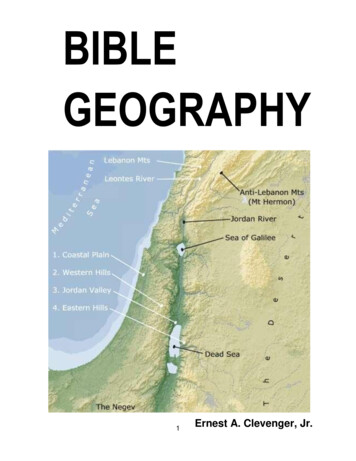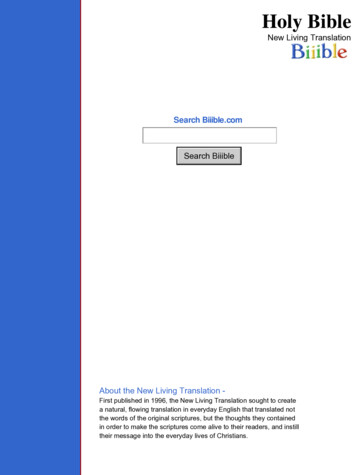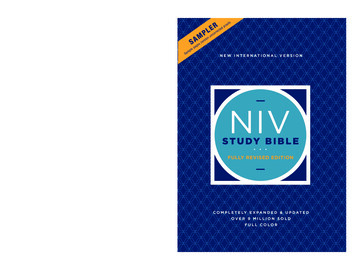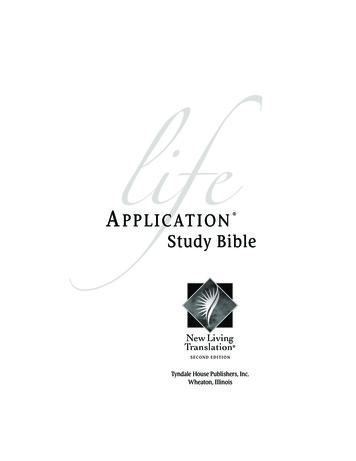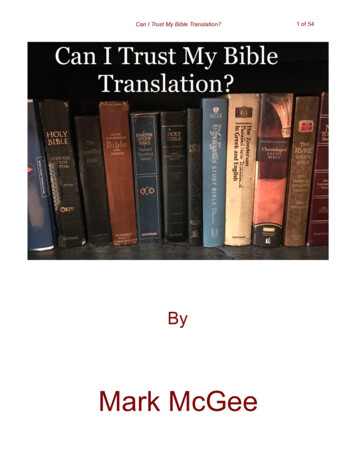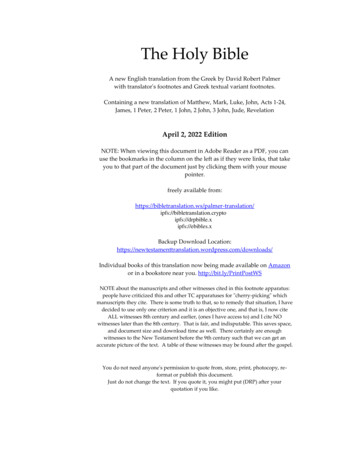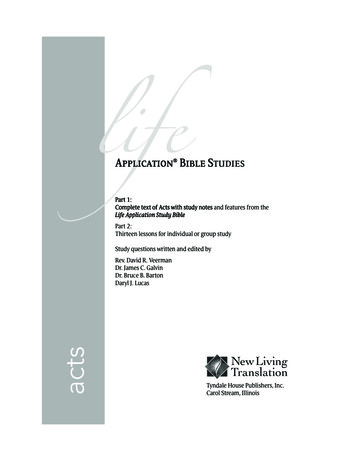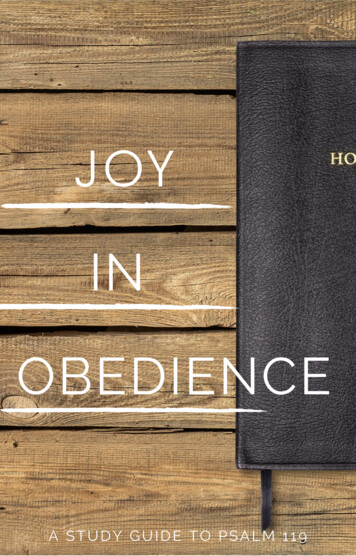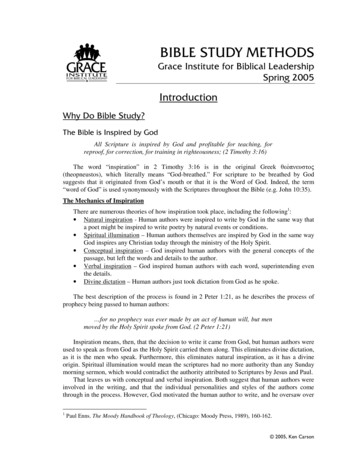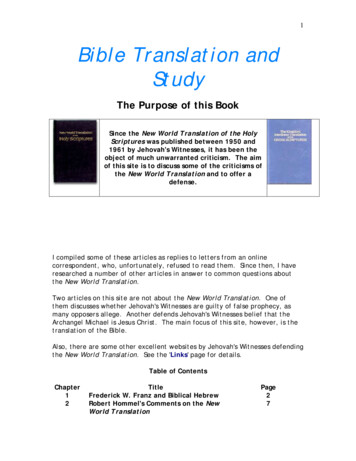
Transcription
1Bible Translation andStudyThe Purpose of this BookSince the New World Translation of the HolyScriptures was published between 1950 and1961 by Jehovah's Witnesses, it has been theobject of much unwarranted criticism. The aimof this site is to discuss some of the criticisms ofthe New World Translation and to offer adefense.I compiled some of these articles as replies to letters from an onlinecorrespondent, who, unfortunately, refused to read them. Since then, I haveresearched a number of other articles in answer to common questions aboutthe New World Translation.Two articles on this site are not about the New World Translation. One ofthem discusses whether Jehovah's Witnesses are guilty of false prophecy, asmany opposers allege. Another defends Jehovah's Witnesses belief that theArchangel Michael is Jesus Christ. The main focus of this site, however, is thetranslation of the Bible.Also, there are some other excellent websites by Jehovah's Witnesses defendingthe New World Translation. See the 'Links' page for details.Table of ContentsChapter12TitleFrederick W. Franz and Biblical HebrewRobert Hommel's Comments on the NewWorld TranslationPage27
234567891011Julius Mantey and the New WorldTranslationMiscellaneous Questions about the NewWorld TranslationThe Kingdom Interlinear Translationand the Deception of "MacGregorMinistries" (Part 1)(Part 2)(Part 3)Worship or Obeisance?"The Fullness of the Divine Quality" inColossians 2:9Does the New World Translation AddWords to Colossians 1:16, 17?Who is the Archangel Michael?The Problem with "False RED ARTICLESOctober 11th, 2005: Does the New World Translation Add Words toColossians 1:17, 18?I have also made some alterations to a few of the articles, particularly thoseconcerning Franz & Hebrew and Hommel & the NWT.July 11th, 2005: "Fullness of the Divine Quality" at Colossians 2:9.June 10th, 2005: The Kingdom Interlinear Translation and the Deception ofMacGregor Ministries. It is amazing the lies that some people will tell tosupport their beliefs. You can read a refutation of some of them in this essay.Frederick W. Franz and Biblical HebrewA number of critical websites make assertions to the effect that Frederick W.Franz, a member of the Governing Body of Jehovah's Witnesses until his deathin 1992, was unable to translate a simple verse from Hebrew into English, whenasked to do so during a court case in Scotland in 1954.
3When one man wrote to me about the aboveassertion, I challenged him to prove it. Hereplied by sending me a copy of RobertHommel's article on the subject. Hommel,however, concedes that Franz was not askedto translate from Hebrew into English, butfrom English into Hebrew. A number ofother sources, however, continue tomisrepresentthe facts.[1]Franz was not askedNow, as theto translate fromcourt recordHebrew into English,shows, Franzbut from English intorefused toHebrew - a differenttranslate amatter altogether.Bible verse from English into Hebrew. First of all,we must agree with Stafford[2] that the fact thatFranz refused to do so, saying "No, I won't attempt to do that," doesn't meanthat he couldn't do it. After all, his knowledge of Hebrew or Greek was not inthe slightest relevant to the subject of the court case at hand, which waswhether Jehovah's Witnesses have the right to ordain ministers of religion . Acourt is not a circus and Franz certainly wasn't obliged to go along with somelawyer's dubious tactics. Franz stood up for himself and refused to play along.At this point it is worth asking what the attorney's point was. It should gowithout saying that if you have a sentence in language A and you translate itinto language B and then someone else translates it back into language A again,you won't necessarily end up with the sentence you started with. Hence, askingsomeone to translate a text from language B back into language A and thencompare the result with the original text really proves nothing. If that was thelawyer's intention, he was either extremely naive regarding how language andtranslation work, or he was being disingenuous. And yet, someone ignorant ofhow translation works could easily be fooled into thinking that the renderingwas defective, simply because it was not identical with the original text.(Presumably this is what Millard means by his observation, 'but, of course, wehave the Hebrew text of Genesis'.[3]) So the lawyer's question either revealed alamentable lack of understanding of translation principles on his part - or elseit was a trap. Under those circumstances, Franz had nothing to gain byattempting to translate.Note, also, how Hommel tries to put words into Millard's mouth. All Millard saidwas that he 'saw no great problem' in rendering the verse into Hebrew, butaccording to Hommel, Millard confirms that "there is no good reason for Franzto have refused to perform an English-to-Hebrew translation". This is not what
4Millard said and, as we have seen, leaves out other likely reasons for Franz'refusal.But even supposing for the sake of argument (not conceding) that Franz wasunable to translate Genesis 2:4 from English into Hebrew, would that affectthis qualifications as a Bible translator? Is translating from English into Hebrewthe same as translating from Hebrew into English? An important principle intranslation work is this: you work from the foreign language into your mothertongue. Contradicting Hommel's view that this is a "detail", something "of littlesignificance in determining Franz's skill in Biblical Hebrew", The Translator'sHandbook by Morry Sofer points out:"A distinction must be made between the languages one translates fromand into. Generally speaking, one translates from another language intoone's own native language. This is because one is usually intimatelyfamiliar with one's own language, while even years of study andexperience do not necessarily enable one to be completely at home withan acquired language. The exceptions to this rule are usually thosepeople who have lived in more than one culture, and have spoken morethan one language on a regular basis. Those may be able to translate inboth directions. There are also rare gifted individuals who havemastered another language to such a degree that they can go both ways.They are indeed extremely rare. Given all of this, one should allow forthe fact that while the ability of the accomplished translator to writeand speak in the target language (i.e., one's native tongue) may beflawless, that person may not necessarily be able to write excellentprose or give great speeches in the source language (i.e., the languagefrom which one translates). Then again, it is not necessary to be able towrite and speak well in the language one translates from, while it is tobe expected that a good translator is also a good writer and speaker inhis or her native language."[4]What the Translator's Handbook says here is self-evident to most peopleworking in translation.[5] Many people work as competent translators withoutbeing able speak or write the source language well. That is not to say that theycan't speak it at all, but they can't speak it flawlessly. Translating, on the otherhand, which implies understanding the text in the source language andrendering it into the target language, is a different matter altogether. F. W.Franz certainly knew the difference. He had just told the court: "I do notspeak Hebrew." So, obviously, the fact that Franz decided not to translate theverse certainly does not prove that he was incompetent to translate Hebrewinto English and is even less relevant to the question of whether he couldtranslate Greek into English.
5In any case, as Stafford - who does know Hebrew - points out in his book, theverse in question (Genesis 2:4) isn't all that easy toIt is not necessary totranslate. He says: "It should not be overlookedbe able to write andthat this verse is actually somewhat complicated.speak well in theIt has no finite verb but one Niphal infinitivelanguage that oneconstruct, with suffix, and one Qal infinitivetranslates fromconstruct"[6] Even Hommel's own star witness,Millard, recognises that there is "uncertainty overThe Translator'sthe passage."!HandbookIndeed, Rolf Furuli relates his own experiment with two professors of Hebrew:"I asked two of my colleagues who teach Hebrew at the University ofOslo, to translate the passage. Both had problems with the translationfrom English to Hebrew, even though they both are experiencedteachers, and their results were very different."[7]In fact, all Bible translators, not just the NWT translators, make generous useof lexicons, grammars, commentaries and other translation aids. Few, if any, ofthem approach their work so casually as to attempt to translate withoutrecourse to all the printed scholarship that is available. It is simply notexpected of a translator that he or she should be able to work without all theseaids. As The Translator's Handbook puts it:No translator, no matter how accomplished or well versed in both thesource and target languages, can do without dictionaries and referenceliterature.[8]So, translation involves careful study of a widevariety of resources. Furthermore, translation is asynergistic group effort, in which a number ofdifferent translators contribute their expertise andtalents. Additionally, there is no reason why theNew World Translation Committee could not havesought the input and comments of a number ofauthorities on Bible languages, both inside andoutside the Jehovah's Witnesses organization.Two of mycolleagues who teachHebrew at theUniversity of Oslo .had problems with thetranslation [of Genesis2:4] from English toHebrew.Rolf FuruliFinally, Millard observes that 'there is a differencebetween translating into a language and freely composing in it'. He doesn'tstate what the difference is, but we would submit that translating into alanguage is actually more difficult. When expressing your own thoughts in aforeign language, if you have difficulty with a certain sentence construction,grammatical detail or vocabulary item, you have the option of stating mattersdifferently. You have the right to express your thoughts in your own words. Butwhen you're translating, the thoughts aren't yours. You have the additional
6responsibility to faithfully represent the original. So you are working undertighter constraints. Translation is therefore more difficult than freelycomposing in a language. And, of course, translating verbally before anaudience, without preparation and under psychological pressure, is moredifficult still.So, leaving aside for a moment the unresolved question of whether Franz waseven on the NWT translation committee, my correspondent's original assertion,namely that Franz was unable to translate a simple verse from Hebrew intoEnglish has been demonstrated to be incorrect in all its details.(1) Franz was asked to translate into Hebrew not from Hebrew into English.(2) It can't be proved that Franz couldn't translate the verse, only that hedidn't want to, and there are perfectly reasonable alternative explanations forthat.(3) It is not a simple verse, as two teachers of Hebrew at University level haddifficulty in translating it and even Hommel's own source says that there is'uncertainty over the passage'.A quick Google search shows that there are quite a few sites still perpetuatingthis calumny. That should raise a red flag for cautious readers, some of whommight like to try an experiment: write to one or two of them and suggestingthat they correct the error? There is more than enough evidence for them to doso. If it is just an oversight rather than a deliberate attempt to smear Franz,then surely they'll be happy to make a correction and issue an apology. If, onthe other hand, what they're really up to is character assassination, then thebest you can hope for is that they'll ignore you.The real truth is this: Witness critics don't like Franz because he was aJehovah's Witness. They have deliberately misrepresented the facts about thiswhole matter, slinging as much dirt as they can in Franz' direction, hoping thatsome of it will stick. These are the worst kind of gutter tactics and pretty muchwhat we have come to expect from many critics of the Watch Tower. Even ifwe do not agree with every rendering in the New World Translation, it is timefor critics to admit that it is not some sort of evil propaganda but rather it'swhat James Parkinson calls it: "A relatively accurate translation from anothertheological perspective." So how about it? If Benjamin Kedar - quoted in thearticle Hommel and the New World Translation - can admit the accuracy of theNew World Translation without becoming a Jehovah's Witness, so can they!
7For instance, Walter Martin, Kingdom of the Cults (1997) page 124 asserts that F. W. Franz"admitted under oath that he could not translate Genesis 2:4 from the Hebrew". At the time ofwriting, the exact same - entirely false - accusation was repeated on at least 29 websites. Itseems that few people bothered to check the facts cited by Walter Martin, until Greg Staffordpublished Jehovah's Witnesses Defended, 2nd Ed., which exposed this distortion of the truth.[1][2]Jehovah's Witnesses Defended, 2nd Ed., pp. 561-4.Millard's full reply, as quoted by Hommel, is: "I see no great problem in rendering Genesis 2:4from English into Hebrew, but, of course, we have the Hebrew text of Genesis. There is adifference between translating into a language and freely composing in it, which, I assume, iswhat LaSor meant . I suspect that the uncertainty over this passage arises from the commonmodern view that there is a break between the first part of the verse and the second, a breakthat is made in many modern translations. Some, on the other hand, do not see the necessityfor supposing such a break exists and the first part of the verse introduces the rest of thechapter. The translation back into Hebrew would depend to some extent on the English versionbeing used." Hommel uses ellipses, showing that he has omitted something from Millard'sreply. Regrettably, we do not know why the material was omitted. It is to be hoped thatHommel has not succumbed to the temptation to quote Millard selectively.[3][4]The Translator's Handbook, Morry Sofer, page 34.[5]The present author worked as a translator and interpreter for a period of about five years.[6]Jehovah's Witnesses Defended, 2nd Ed., pp. 561-4[7]B-Hebrew discussion list, 15/6/01[8]The Translator's Handbook, p. 99.Robert Hommel's Comments on the New WorldTranslationIt seems that attacks on the NWT fall into two main categories, (a) that the NWT isbiased in that it has been specially produced to support the beliefs of Jehovah'sWitnesses and (b) that the NWT translators were incapable of producing an accurateBible translation. Leaving aside the first charge, which can only really be answered ona case-by-case basis, it is interesting to consider the second accusation.If it were really true that the New World Translation committee was not made up ofcompetent Greek and Hebrew scholars, then it should be relatively easy for opposersto point to hundreds of infelicitous and incorrect renderings in areas that were notdoctrinally contentious. In practice, however, such criticisms are few and farbetween. Most attacks on the NWT focus on certain controversial verses, consideredimportant because of relevance to Christian doctrine. This in itself is a strongargument against the assertion that the translators did not really know Hebrew andGreek.
8Opposers of Jehovah's Witnesses frequently criticize the New World Translation on thebasis of the credentials of the translators. Of course, the translators were anonymous,so it is not known what, if any, paper qualifications they had. In any case, the lack offormal qualifications would not necessarily disqualify a person from being a talentedand capable translator. There are more ways to learn Biblical languages andtranslation skills than through traditional university studies.In this article, we shall discuss claims made by Robert Hommel, who has written anarticle on the subject. Hommel believes that Greg Stafford's defense of Fred Franz is"superficial, inaccurate and misleading". [1].The first thing we have to acknowledge is that we don't really knowfor certain who produced the New World Translation. Of course,various writers have made assertions on the matter, but, until proofis forthcoming, that is all they are - assertions. To say that Franz oranyone else was on the New World Bible Translation Committee ispure speculation. It may be true and it may be false. It would notbe at all surprising if F. W. Franz were one of the translators,possibly even the main translator. But the fact remains that wedon't know for sure. How can critics insist so vehemently on thetruth of something for which they have so little proof?What is surely beyond dispute is that someone translated the New World Translation.After all, translations don't make themselves. And to be able to translate the HebrewScriptures, someone had to know Hebrew. The idea that a person or group of personswith little or no knowledge of Hebrew could translate the whole of the Old Testament- as Hommel apparently believes - stretches credibility to its very limits.That is even more obvious if you consider the comments of a man like Benjamin Kedar,who is an a professor at the Hebrew University of Jerusalem:"In my linguistic research in connection with theHebrewBible and translations, I often refer to theI have neverdiscovered in the 'New English edition of what is known as the 'New WorldTranslation.' In so doing, I find my feeling repeatedlyWorld Translation' [ofconfirmed that this work reflects an honest endeavorthe Hebrew Scriptures] to achieve an understanding of the text that is asany biased intent toaccurate as possible. Giving evidence of a broadread something into the command of the original language, it renders thetext that it does notoriginal words into a second language understandablycontainwithout deviating unnecessarily from the specificstructure of the Hebrew . Every statement oflanguage allows for a certain latitude in interpreting orProfessor Benjamintranslating. So the linguistic solution in any given caseKedar, HebrewUniversity of Jerusalem. may be open to debate. But I have never discovered inthe 'New World Translation' any biased intent to readsomething into the text that it does not contain."Let's analyse what Professor Kedar is able to tell us. First of all, is he qualified toexpress an opinion? Some critics think not. True, he is apparently not a teacher ofBiblical Hebrew, or a translator. But, to engage in 'linguistic research in connection
9with the Hebrew Bible', Professor Kedar of the Hebrew University of Jerusalem mustsurely be a competent scholar of Hebrew.Kedar is no friend of the Watch Tower Society. In a subsequent communication he isquite critical of the Jehovah's Witnesses' organization, and even remarks: "I do not feelany sympathy for any sect and this includes Jehovah's Witnesses." But Kedarapparently has the integrity to admit that even people he doesn't like can achieveworthy objectives that should be recognised. Perhaps Kedar doesn't feel pressured todefend a particular doctrinal position. When challenged about his statement [2] , hestood by his original comments about the New World Translation of the HebrewScriptures, stating:"Several years ago I quoted the so-called New World Translation among severalBible versions in articles that deal with purely philological questions (such asthe rendition of the causitive hiphil, of the participle qotel). In the course ofmy comparative studies I found the NWT rather illuminating: it gives evidenceof an acute awareness of the structural characteristics of Hebrew as well as ofan honest effort to faithfully render these in the target language. A translationis bound to be a compromise, and as such its details are open to criticism; thisapplies to the NWT too. In the portion corresponding to the Hebrew Bible,however, I have never come upon an obviously erroneous rendition whichwould find its explanation in a dogmatic bias. Repeatedly I have asked theantagonists of the Watchtower-Bible who turned to me for a clarification of myviews, to name specific verses for a renewed scrutiny. This either was not doneor else the verses submitted (e.g. Genesis 4:13; 6:3; 10:9; 15:5; 18:20; etc.)did not prove the point, namely, a tendentious translation."[3]Kedar obviously has a lot to teach many of the Watch Tower Society's detractors aboutimpartiality, bracketing and scholarly debate. To put it simply: just because you don'tlike Jehovah's Witnesses or disagree with them doctrinally, that does not give you theright to make unsubstantiated accusations againstthem.It is not necessaryRobert Hommel has made an astonishing conjecture,to know thewhich he rather arrogantly calls a 'fact', that "anyonetranslators' academicwith an adequate library of English Bibles, Lexicons,qualifications in orderand Bible Dictionaries could produce a translationto assess the qualitysimilar to the NWT, with only a limited knowledge ofof the translationthe original languages." Hommel does not say whetherhe or anyone he knows has actually tried such anexperiment. Of course, all translators have recourse to lexicons, concordances,dictionaries and other reference material. Indeed, it would be foolish for anyone toattempt to make a Bible translation without drawing on the centuries of scholarshipthat had preceded them. That applies to the translators of the NWT just as much asto all other Bible translators. However, Kedar's words speak for themselves. You don'tget a "broad command of the original language" or an "acute awareness of thestructural characteristics of Hebrew" by playing around with dictionaries and copyingout of other Bible translations![4]Rolf Furuli, who is a Lecturer in Semitic Languages at Oslo University, says with regardto the Hebrew portion of the NWT:
10"In connection with writing my book I read the English text of the NWT against theHebrew text, word for word. After first reading the Hebrew and then the English text,I sometimes said to myself: "Was this nuance really in the Hebrew text?" And certainlyit was! The translators of the NWT have been extremely faithful both to their owntranslation principles and to the Hebrew text."[5]Now, I think it's obvious that neither Kedar nor Furuli would be able to make thecomments they did if the NWT translators had minimal or no knowledge of Hebrew.Hence, to say that the translators had no scholarship is patently untrue.Hommel rejects the view that "the NWT itself is testimony that the Committee wasskilled in the original languages", believing that such an approach ‘begs the question',and asserts: "To demonstrate that the NWT is, indeed, a scholarly translation, onemust produce positive evidence that the Translators possessed the skills necessary torender the Bible from the original languages into English." Of course, Hommel is rightwhen he implies that it is not the instances where the NWT renderings coincide withother translations that show the quality of the translation, but rather the instanceswhere they differ. And a different rendering could conceivably be the result of eithersuperior scholarship or of ignorance. But to determine which of the two it was doesnot require that we know the qualifications (on paper or otherwise) of the translators.What it does require is that we examine the actual evidence for and against each ofthe renderings and make our own judgment. So if Hommel means that an examinationof the translation itself by competent Hebrew scholars is insufficient 'positiveevidence' of the translators' skills, then his assertion is palpably untrue. If Hommel'sview were correct, it would be impossible to determine the accuracy of any number oftranslations, such as the Greek Septuagint, whose translators remain anonymous tothis day. As it is, anyone with a knowledge of the original and target languages cancompare the two and make a judgment about whether the translation is accurate ornot (which is precisely what people like Kedar and Furuli have done) and, on thatbasis, draw inferences about the skills of the translators.[6]Hommel's argument can also be refuted another way: if assessing the quality ofvarious renderings is not a legitimate way of proving the scholarly credentials of theanonymous translators, then neither is it a way of disproving them! If you can't usegood renderings to infer that the translators were competent, then neither can youuse poor renderings to infer the opposite.[7]Interestingly, although Hommel maintains that "there is no evidence that the NWTTranslation Committee possessed the training or skills necessary to produce an EnglishBible from the original languages", his article fails to mention a single rendering thathe views as evidence of lack of competence. The maxim ‘publish or perish' wouldseem to apply here.Scholar Frederick Fyvie Bruce provides food for thought in his book "A History of theEnglish Bible" when he speaks of Thomas More's reaction to the Tyndaletranslation:"It affords no pleasure to us to-day to contemplate two great Englishmen, menof principle who were both to suffer death for conscience sake, engaging inbitter controversy of this kind. But the issue was one in which the lives of men- and, as both Tyndale and More believed, the souls of men - were at stake;
11and both men would probably have thought that the urbanities of moderntheological debate betokened a failure to appreciate the seriousness of theissue. Yet More was no bigoted obscurantist; he was a leading humanist andpatron of the new learning, and a warm friend of Erasmus, whose Greek NewTestament Tyndale had now turned into English. One might have thought thathe would at least have appreciated the cultural value of Tyndale's work,however much he deplored Tyndale's theological position."But no: Tyndale's New Testament, said More, was not the NewTestament at all; it was a cunning counterfeit, so perverted in theinterests of heresy "that it was not worthy to be called Christ'stestament, but either Tyndale's own testament or the testament of hismaster Antichrist." To search for errors in it was like searching for waterin the sea; it was so bad that it could not be mended, "for it is easier tomake a web of new cloth than it is to sew up every hole in a net."We may well rub our eyes at these charges. Tyndale's New Testamentlies before us, and Erasmus's Greek Testament of which it is atranslation, and we can only be surprised that a scholar like More shouldgo to such lengths in denouncing so good an achievement. True, therewere things in it which were capable of improvement, as Tyndalehimself acknowledged, but it was a pioneer work; the New Testamenthad never been turned from Greek directly into English before. Tyndalecomplained that if his printer so much as failed to dot an i, it wassolemnly noted down and reckoned as a heresy."[8]This passage contains some very sobering thoughts. It is easy to criticise whatwe do not agree with. But it is quite another thing to defend our criticisms.By the way, have you ever seen 'The Watchtower' launch vitriolic attacks onother translations the way many of its critics do? Of course, reasoned critiquesof the rendering of certain verses are published, but there is nothingapproaching the venom that comes across in many web pages that criticise theNew World Translation. In fact, Watch Tower publications have quotedliterally dozens of Bible translations. In just one year (2003), 'The Watchtower'quoted from the Contemporary English Version, An American Translation,Charles B. Williams, the Greek Septuagint, J. B. Philips, Today's EnglishVersion, the New International Version, the Jerusalem Bible, King JamesVersion, Revised Standard Version and the New Jerusalem Bible. We have towonder: Who is being reasonable and who is fanatical?Footnotes and References[1]Hommel's article can be found at http://www.forananswer.org/Top JW/FranzNWT.htm
12Perhaps Kedar was unaware at the time of his original statement of the reaction that hisopinions would provoke. Anyone who comes out publicly as agreeing with anything Jehovah'sWitnesses do or teach is likely to receive an avalanche of mail and email from religiousopponents trying to induce them to change their minds. In Truth in Translation, Jason Beduhndescribes his fellow scholars as "engaged in their own very specialized and arcane researches,and perhaps unaware (as I was until rudely shaken out of my ignorance) of the debate ragingaround us." (p. ix-x) In any case, the volume of queries received by Kedar after his commentsapparently obliged him to issue a circular letter to be sent to all enquirers. This testifies tothe intensity of the hatred for the New World Translation felt by many opposers.[2][3]Kedar's full statement can be found on many internet sites.Unless, of course, you are getting help from above! But Watchtower has made no such claimand we may reasonably suppose that Hommel would like that explanation even less.[4]B-Hebrew discussion list, 15/6/01. While it is true that Furuli is one of Jehovah's Witnesses,it would not be fair to say that this disqualifies him from expressing an opinion. Are critics whorefuse to accept Furuli's testimony merely because he is a Jehovah's Witness willing to applythe same standard to the scholars they cite? That would mean that no scholar could be trustedto critique a translation that came from his own theological background. To apply that ruleonly to Furuli but not to evangelical scholars is special pleading.[5]It is interesting that well over 90% of criticisms of the New World Translation concern the‘New Testament' portion that was written in Greek. Published criticisms of the NWT's Hebrewrenderings are conspicuous by their almost complete absence, despite the obv
Scriptures was published between 1950 and 1961 by Jehovah's Witnesses, it has been the object of much unwarranted criticism. The aim of this site is to discuss some of the criticisms of the New World Translation and to offer a defense. I compiled so
